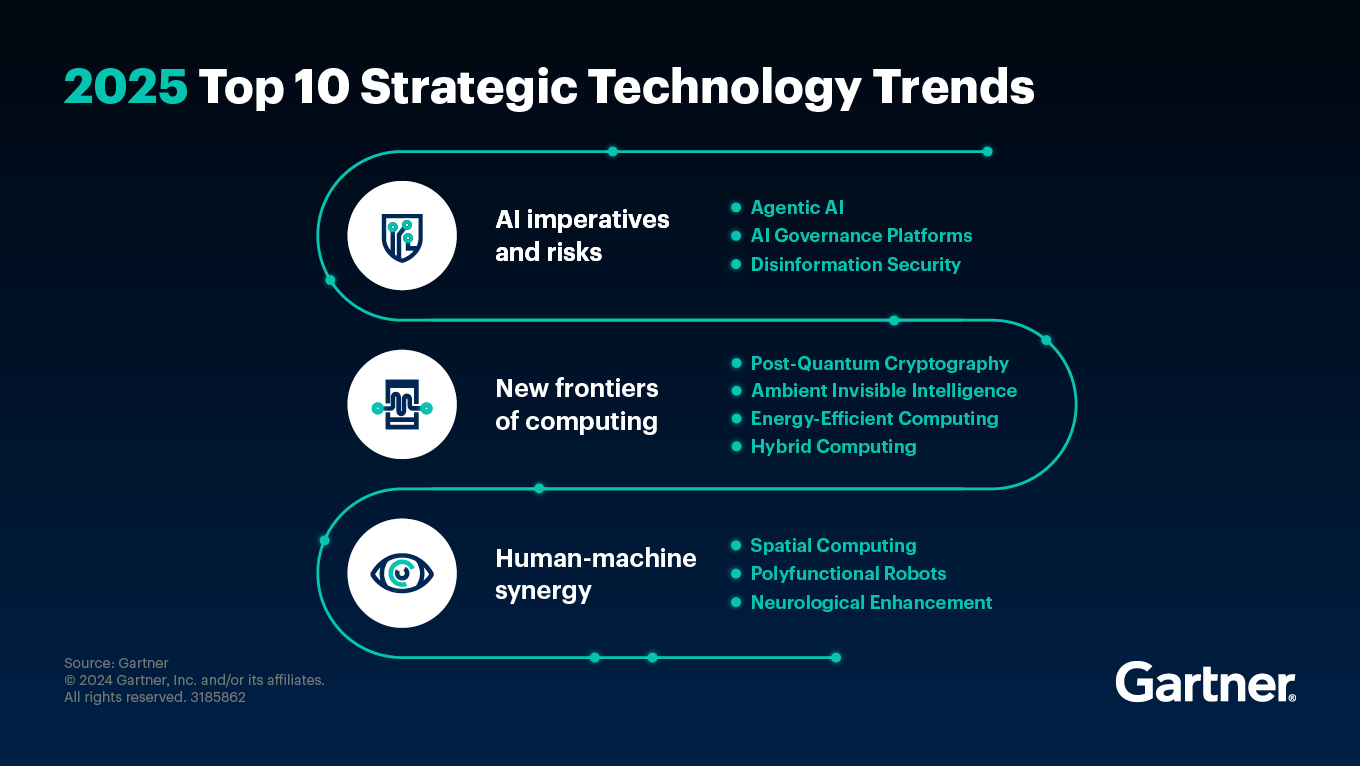As we get closer to 2025, technology is reshaping how businesses operate and how people interact with the world. Gartner’s Top Strategic Technology Trends highlight the key innovations set to define the future, offering insights into how organizations can adapt and thrive.
From smarter AI systems to groundbreaking computing technologies and human-focused innovations, these trends show where the world is heading—and how businesses can stay ahead.
Here are Gartner’s top 10 technology trends for 2025, and what they could mean for your business.
Technology Trend #1 – Agentic AI
Agentic AI refers to systems that independently plan, sense, and act to achieve specific goals. By combining memory and advanced planning capabilities, Agentic AI offers a new level of automation.
Why it matters:
It can enhance productivity, automate customer interactions, and improve decision-making with predictive intelligence.
Example:
Automating customer service to analyze real-time data and provide tailored solutions.
Technology Trend #2 – AI Governance Platforms
These platforms ensure that AI systems align with ethical and societal standards, reducing risks such as bias and privacy violations.
Why it matters:
As AI permeates regulated industries, these platforms ensure fairness and accountability.
Example:
Auditing AI models to ensure decisions are fair and unbiased over time.
Technology Trend #3 – Disinformation Security
With AI amplifying disinformation, these systems combat fake news, phishing, and impersonation.
Why it matters:
Trust in information is critical as adversaries use advanced AI for deception.
Example:
Real-time detection of deepfakes targeting corporate brands.
Technology Trend #4 – Post-Quantum Cryptography (PQC)
As quantum computing becomes a reality, PQC ensures that today’s encrypted data remains secure in the future.
Why it matters:
Cybercriminals are preparing for a quantum-enabled world.
Example:
Encrypting financial transactions with quantum-resistant algorithms.
Technology Trend #5 – Ambient Invisible Intelligence
Low-cost sensors and tags embedded in everyday objects provide real-time visibility across industries.
Why it matters:
It supports smarter operations and advanced analytics.
Example:
Automatically adjusting workplace environments based on occupancy data.
Technology Trend #6 – Energy-Efficient Computing
Technologies like GPUs and neuromorphic systems minimize energy consumption and carbon footprints.
Why it matters:
Sustainability is now a business imperative.
Example:
Reducing data center costs with energy-optimized server systems.
Technology Trend #7 – Hybrid Computing
This trend combines computing technologies like CPUs, GPUs, and quantum systems to solve complex problems.
Why it matters:
Hybrid environments enable scalability and innovation.
Example:
Using the cloud for intensive analytics while keeping sensitive data on-premises.
Technology Trend #8 – Spatial Computing
Bridging the physical and digital worlds, spatial computing creates immersive AR/VR experiences.
Why it matters:
It opens new business models in gaming, healthcare, and retail.
Example:
Conducting remote team meetings in realistic 3D environments.
Technology Trend #9 – Polyfunctional Robots
Robots capable of performing multiple tasks are transforming industries like manufacturing and healthcare.
Why it matters:
Rising labor costs and accessible pricing make these robots valuable.
Example:
Warehouse robots picking and packing goods.
Technology Trend #10 – Neurological Enhancement
Tools and technologies that enhance human cognitive abilities or productivity.
Why it matters:
Neurological enhancement could help improve employee focus, reduce mistakes, and streamline training processes.
Example:
A call center could use wearable devices that track stress levels and provide real-time prompts for employees to take short breaks.
The Way Forward
Gartner’s 2025 technology trends highlight key innovations that can help organizations grow and adapt. The focus should be on choosing the trends that best fit their needs, improving efficiency, and preparing for what’s ahead. With the right approach, these technologies can become valuable tools for building a stronger, more resilient future.
About TSG
The Swenson Group (TSG) is an award-winning Bay Area Managed Service Provider that has helped thousands of organizations achieve more by leveraging cost effective technologies to be more productive, secure and cost effective. Services include Managed Print, Document Management, IT Services and VoIP. Products include MFPs, Copiers, Printers and Production Systems, Software and Solution Apps. For the latest industry trends and technology insights visit TSG’s main Blog page.
Subscribe to our Blog
What is a Document Management System?
A beginner's guide to managing documents from paper to intelligent automated workflows.








